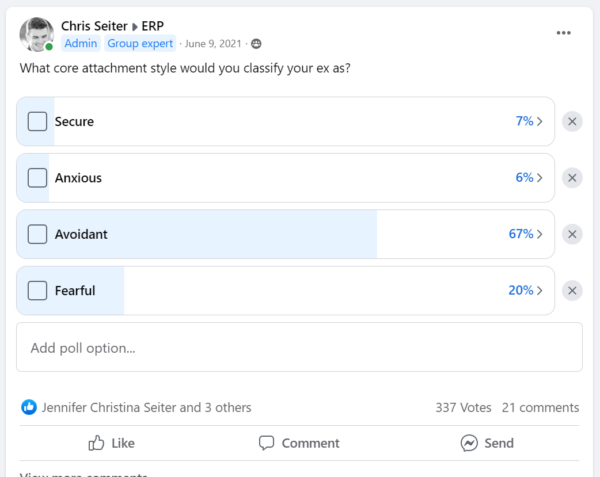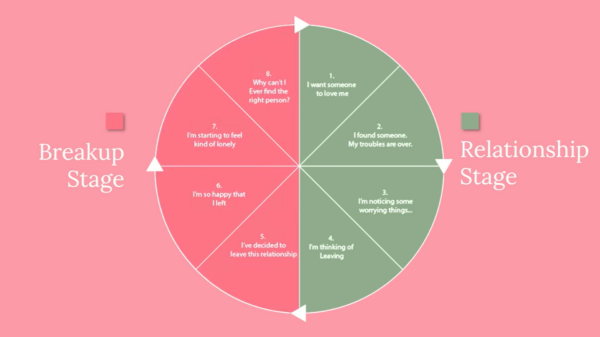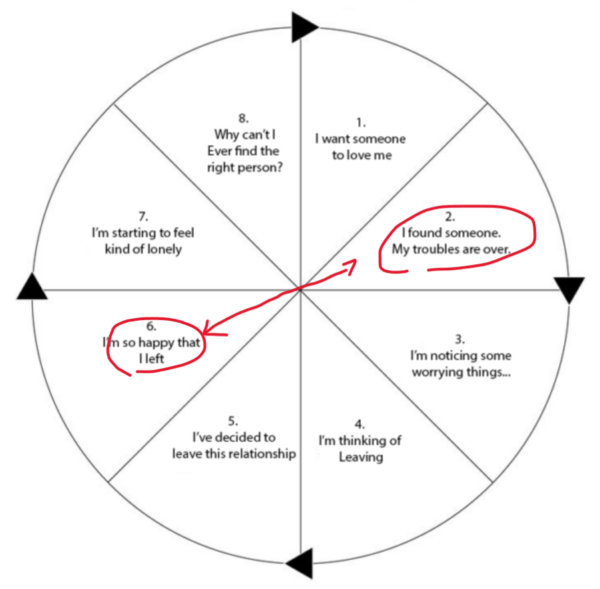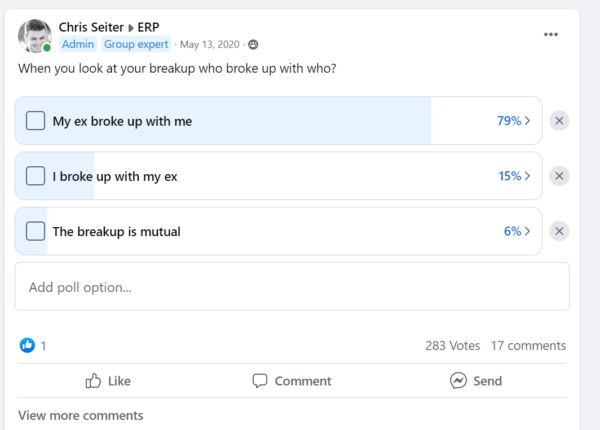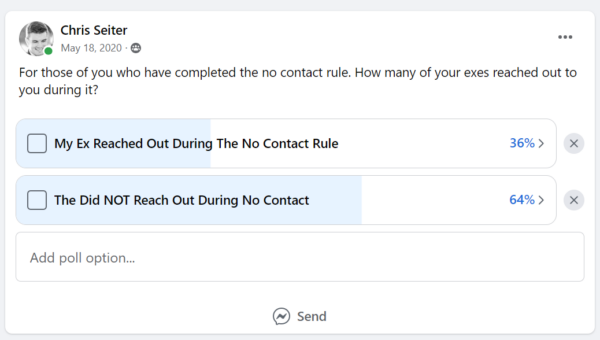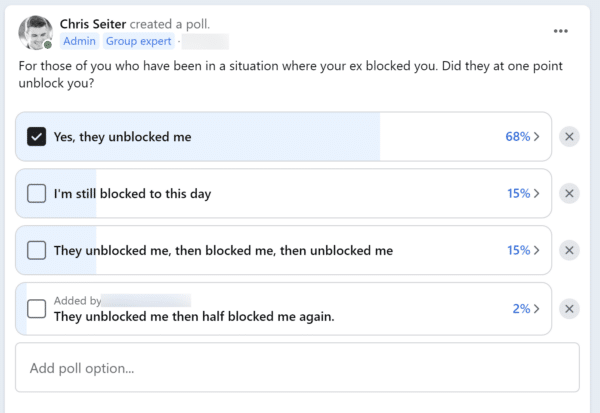Today we’re going to be taking an in-depth look at what happens when you ignore a ghoster.
Ultimately I think the best way to tackle this is to divide the discussion up into two categories,
- Answering why most people get ghosted in the first place
- And going through the five most common outcomes that will occur if you ignore a ghoster
Let’s just jump right into it.

What Are Your Chances of Getting Your Ex Boyfriend Back?
Take the quizWhy Most People Get Ghosted In The First Place?
Ultimately there are a lot of different reasons for why you could be “ghosted” in the first place.
I think I’d boil them down into 7 different categories.
- Fear of confrontation
- Mismatched expectations
- Personal Issues
- Impulsivity
- Negative past experiences
- Technological factors
- Societal influences
Let’s take a minute and talk through each of these categories
1. Fear of Confrontation:
- Conflict Avoidance: Some individuals might find it easier to disappear rather than having to confront someone and potentially engage in a conflict or difficult conversation.
- Fear of Rejection: They may ghost someone to avoid the potential feeling of being rejected themselves if they express their true feelings or intentions.
2. Mismatched Expectations or Intentions:
- Lack of Interest: People may realize they aren’t as interested in someone as they initially thought, and instead of communicating this, they might choose to ghost.
- Different Goals: Sometimes individuals discover that they have different relationship goals or are looking for different things, leading them to ghost.
3. Personal Issues:
- Mental Health Challenges: Some people may be dealing with personal issues or mental health challenges that make it difficult for them to maintain a relationship.
- Overwhelmed: They may feel overwhelmed with other aspects of their life and find it easier to ghost someone rather than explaining their situation.
4. Impulsivity and Lack of Maturity:
- Immaturity: Some individuals may not have developed the emotional maturity to communicate their feelings openly and honestly.
- Impulsive Decision: Sometimes, the decision to ghost is impulsive and doesn’t involve much thought.
5. Negative Past Experiences:
- Past Trauma: Those who have experienced trauma or have been hurt in the past may find it difficult to form or maintain relationships, leading to ghosting.
- Fear of Repeating Past Mistakes: They might ghost someone out of fear of repeating past mistakes or getting hurt again.
6. Technological Factors:
- Online Dating & Social Media: The advent of online dating and social media has made it easier for individuals to ghost others, as they may not feel as accountable for their actions compared to face-to-face interactions.
- Anonymity and Distance: Technology can create a sense of anonymity and distance, making it easier for people to disconnect without explanation.
7. Cultural and Societal Influences:
- Changing Social Norms: In some cases, changing social norms and the increasing acceptance of non-committal relationships may contribute to ghosting.
- Influence of Peer Behavior: People may be influenced by the behaviors and attitudes of their peers, leading to an increase in ghosting.
What Happens When You Ignore A Ghoster
Generally speaking there are five different outcomes that can occur if you ignore a ghoster.
- They’ll Actually Enjoy The Space
- Likely They’ll Get In Touch With You Again
- They Might Have No Reaction
- They’ll Be Surprised
- They’ll Be Disappointed
Let’s talk about each.
Outcome #1: They’ll Actually Enjoy The Space
Ok, the average “ex” that we study exhibits dismissive avoidant tendencies,
67% to be exact.
This means that likely they are going to go through this cycle,
This is what I like to call the “avoidant death wheel.” It essentially breaks down their experience during and after a relationship.
There are eight stages to it,
- I want someone to love me (contrary to what most people believe dismissives don’t want to be alone)
- I found someone my problems are over (yay, they enter into a honeymoon period)
- I’m noticing some worrying things (Usually something triggers their avoidant side from the partner)
- They start thinking of leaving (They don’t actually leave yet though. They just start planning it)
- Then they actually leave (self explanatory)
- They are ecstatic they left (the separation elation phase)
- Then they start to feel a little lonely
- Wonder why this is always happening to them
It’s really stage six that I want to highlight here.
This is the separation elation phase. Why this is important is because the core wound of a dismissive avoidant is a fear of losing their independence. Therefore, when you ignore a ghoster who is a dismissive they will actually enjoy it.
Because to them it feels like they are getting the first thing they’ve wanted in a long time, independence.
They go through this second mini honeymoon period similar to the first one.
But it doesn’t necessarily last forever.

What Are Your Chances of Getting Your Ex Boyfriend Back?
Take the quizThat’s where our next discussion point comes into play.
Outcome #2: They’ll Likely Get In Touch With You Again At Some Point
So, I personally feel that my team and I have done a lot of research on this. After all, the no contact rule is essentially nothing more than you “ignoring” someone.
First let’s look at some baseline statistics.
Most of the clients that we are helping have been broken up with,
Well, 80% to be exact (if you round up.)
The first thing that we recommend for our clients to do is always to implement a period of no contact.
This would be the titular “ignoring an ex” thing. However, this discussion is supposed to revolve around an ex GHOSTING you. Well, what if I were to tell you that in 65% of the cases that’s exactly what happens.
You see this,
Our clients being “ghosted” or ignored is actually the norm.
But I’ve actually never had a client that hasn’t at one point had a conversation with that ex again. In fact, to back this up I tried to poll the extreme. I literally asked my clients who were blocked if they had ever gotten unblocked.
68% of participants said that their ex, who had previously blocked them, eventually unblocked them.
While being on the receiving end of being ghosted sucks and doesn’t feel great it isn’t exactly the norm to stay there forever.
Outcome #3: They Might Not React At All
Now, with that being said there are exes out there who are just too caught up in their avoidant tendencies to care.
While it’s true that all my polling suggests that being ghosted forever by an ex specifically isn’t usually normal there are some exes who will be exceptions to that rule.
In these cases, where the exes are wrapped up in their avoidant tendencies, they might not necessarily be acting out of malice but rather an inability to engage in a healthy and straightforward manner.
Remember our statistics on avoidants,
These individuals can be deeply entrenched in patterns of avoidance, which can stem from a variety of complex, underlying issues such as fear of intimacy, past traumas, or deep-seated fears of rejection.

What Are Your Chances of Getting Your Ex Boyfriend Back?
Take the quizThe exception to the “rule” that people usually don’t get ghosted forever by an ex is that sometimes, the ghosting ex might indeed never come back.
These individuals have a heightened capacity to detach, distance, and isolate themselves, potentially as a self-preserving mechanism. Their decision to stay away might be reinforced by a belief that they are protecting not only themselves but also the person they ghosted, from further emotional entanglements or complexities.
Moreover, the digital age has facilitated this kind of detachment, making it easier to vanish without traces and without having to face the repercussions of their actions directly. Their virtual disappearance acts as a shield, protecting them from the emotional intricacies and confrontations that usually accompany endings.
Outcome #4: You May Have A Ghoster Who Is Surprised
One of the most underrated aspects of breakups is that of perception.
Your ex has a certain perception of you.
Many things make up this perception,
- How you acted before you were together
- How you acted while you were together
- How you acted after the breakup
Let’s say that the only signals your ex has throughout your time together is that you are an extremely anxious person.
Throughout the relationship you were controlling, jealous and constantly seeking reassurance.
Then after the relationship you beg for your ex back, grow outwardly jealous with every social media comment they make on someone else’s post.
You get the idea.
Now, let me ask you a question.
What would your perception be of someone like that? I know what I’d think. I’d literally think that after a breakup this person is going to blow my phone up every other day.
And for many exes who ghost you that’s the thought process going on.
And yet, if you do the opposite of that it can be incredibly surprising. You are essentially bucking the trend of what’s expected of you.
Outcome #5: They’ll Be Disappointed
A ghoster might feel disappointed not hearing back from you because their action of ghosting might not always stem from a desire for complete severance, but sometimes as a convoluted test of your interest level or attachment.
Not receiving a message from you could shake their perceived control over the situation or dismantle their expectations. Furthermore, it might force them to face the reality of their avoidant behavior and its consequences.
This disappointment could also be intertwined with a blow to their ego, especially if they were relying on the notion that you would be constantly available to them despite their erratic and non-committal behavior.
Additionally, the lack of response from you may bring an unexpected finality to the relationship, a real end that they weren’t entirely prepared to face, thus leaving them grappling with a mixture of disappointment and possibly, regret.
